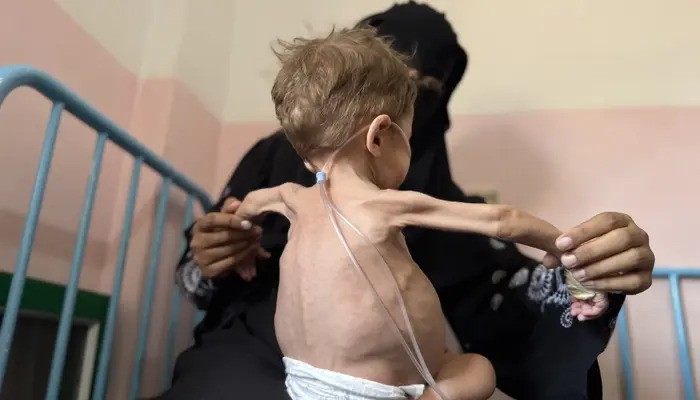The UN declares full-blown famine in Gaza, warning that more than half a million Palestinians are enduring catastrophic conditions marked by starvation, destitution, and death. The announcement underscores the gravity of the humanitarian crisis as relentless Israeli attacks continue to worsen the plight of civilians.
According to the Integrated Food Security Phase Classification (IPC), the UN-backed system for measuring access to food, Gaza has officially entered famine conditions. This is the most severe level of food insecurity, defined by widespread hunger, malnutrition, and the likelihood of mass casualties if immediate relief is not provided.
UN officials said that over 500,000 Palestinians are now trapped in situations where food is almost non-existent. Many families are surviving on minimal supplies, relying on unsafe water and consuming leaves or animal feed to endure the crisis.
A UN humanitarian coordinator described the situation as “a man-made disaster,” emphasizing that the collapse of essential services, combined with the blockade and ongoing military operations, has cut off ordinary Gazans from food and medical aid.
Read more: China-Pakistan Strategic Dialogue: Wang Yi Meets COAS Asim Munir in Islamabad
Famine declared by IPC in #Gaza Governorate is a direct result of actions by #Israel‘s Government that has unlawfully restricted entry & distribution of humanitarian aid.
It is a war crime to use starvation as a method of warfare, and the resulting deaths may also amount to a… pic.twitter.com/knqnRpe2yH
— UN Human Rights (@UNHumanRights) August 22, 2025
Israel Rejects UN Famine Classification
Israel’s Foreign Ministry strongly rejected the UN findings, calling them baseless and politically motivated. A ministry spokesperson claimed there is “no famine in Gaza,” dismissing the IPC report as propaganda influenced by Hamas.
The Israeli government argued that aid continues to enter Gaza and accused international organizations of failing to hold Hamas responsible for controlling supplies. Officials said they would continue their military operations in Gaza City despite growing global criticism of the humanitarian toll.
This rejection adds to the deepening dispute between Israel and international bodies over the handling of the crisis, with the UN maintaining that restrictions on aid deliveries and destruction of infrastructure have fueled famine-like conditions.
Rising Death Toll in Gaza
While food insecurity worsens, the violence on the ground continues. Palestinian hospital sources told Al Jazeera that 47 people were killed in Gaza since dawn on Friday due to Israeli strikes.
The majority of these deaths, at least 31, occurred in Gaza City, where Israeli forces have intensified operations in an attempt to seize control of the largest urban centre in the enclave. Witnesses reported heavy bombardments and street battles that forced families to flee their homes.
Medical staff said five of the victims were civilians who had gathered in hopes of receiving aid. This highlights the deadly intersection of hunger and violence, as desperate Gazans risk their lives in search of food and relief.
Humanitarian Catastrophe
The declaration of famine underscores the urgent need for international intervention. Aid groups warn that without immediate, large-scale humanitarian assistance, the death toll from starvation could quickly surpass those caused by military action.
Children are bearing the heaviest burden. Malnutrition rates among Gaza’s youngest have skyrocketed, with reports of infants dying from hunger-related complications. Health workers say hospitals, already overwhelmed by war casualties, are unable to treat the surge in hunger-related illnesses due to shortages of medicine, fuel, and electricity.
The World Food Programme (WFP) has called for unrestricted access to Gaza, stressing that trucks carrying food supplies are often delayed or denied entry. Aid convoys that do reach the enclave face dangerous conditions, with several recent incidents of vehicles being struck during military operations.
Calls for Ceasefire and Aid
The UN and humanitarian organizations continue to push for an immediate ceasefire to allow safe passage for aid. Officials argue that without halting the conflict, efforts to tackle famine will remain ineffective.
Diplomatic efforts are intensifying, but divisions within the international community persist. While some countries have backed UN appeals for urgent action, others continue to support Israel’s right to conduct military operations, complicating consensus on how to respond to the worsening crisis.
A Growing Global Concern
The UN declaration of famine in Gaza is not only a humanitarian alarm but also a geopolitical challenge. The crisis has sparked widespread protests in several countries, with activists demanding an end to the blockade and urging governments to pressure Israel into allowing full-scale humanitarian relief.
As the situation deteriorates, aid workers warn that Gaza risks becoming a “graveyard for children” unless immediate action is taken. The combination of famine and ongoing bombardments has created what the UN describes as one of the most severe humanitarian crises of the century.
Follow us on Instagram, YouTube, Facebook,, X and TikTok for latest updates
